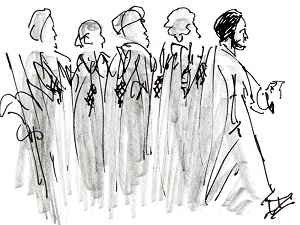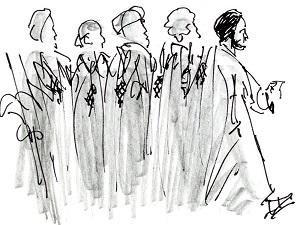

“If you knew what this meant, I desire mercy not sacrifice, you would not have condemned these innocent ones” (Matt 12:8).
The Lectionary once again offers us some interesting parallels in the two readings assigned for today. Exodus 11 describes the preparation for the Passover meal on the eve of the Hebrew departure from Egypt. They are in flight from bondage, fugitive slaves. This sacred meal of lamb, unleavened bread and bitter herbs is the food for Exodus, the start of the great journey to the Promised Land. It is Independence Day for Israel. Freedom is at hand.
In Matthew 12, the legalists are again attacking Jesus’ disciples for gleaning grain as they pass through the fields on the sabbath. This “work” violates the Sabbath rest, making Jesus and his band illegal. Jesus answers with the story of when David and his hungry men ate the dedicated temple bread, another illegal act. Moreover, when this took place, David was a fugitive being pursued by Saul. He is an outlaw with a price on his head.
The lesson in both Scriptures is that human need is a higher law than any official or religious rule. The Son of Man -- Human Being -- is Lord of the sabbath, not the other way around. Wherever systems of laws or official policies cause human suffering, they fail in every way, for the purpose of law is the protection of human dignity and the common good.
We might ask if this does not go to the heart of the debate over the treatment of refugees and asylum seekers at our borders. Designating people as illegal or undocumented does not change their basic status and dignity as human beings. It does not justify inhumane treatment as a deterrent or to score political points. If circumstances have created a national crisis, they also require a national response that reflects our deepest values and priorities.
Jesus trumps his critics, so concerned about the sabbath that they prefer ritual purity to human need, by quoting the Prophet Hosea: “I desire mercy not sacrifice, and the knowledge of God over burnt offerings” (6:6). To know God in any circumstance is to begin with the revelation that God is mercy. God knows no law more important than love, and if we know God we will also know this and act accordingly.
Advertisement






